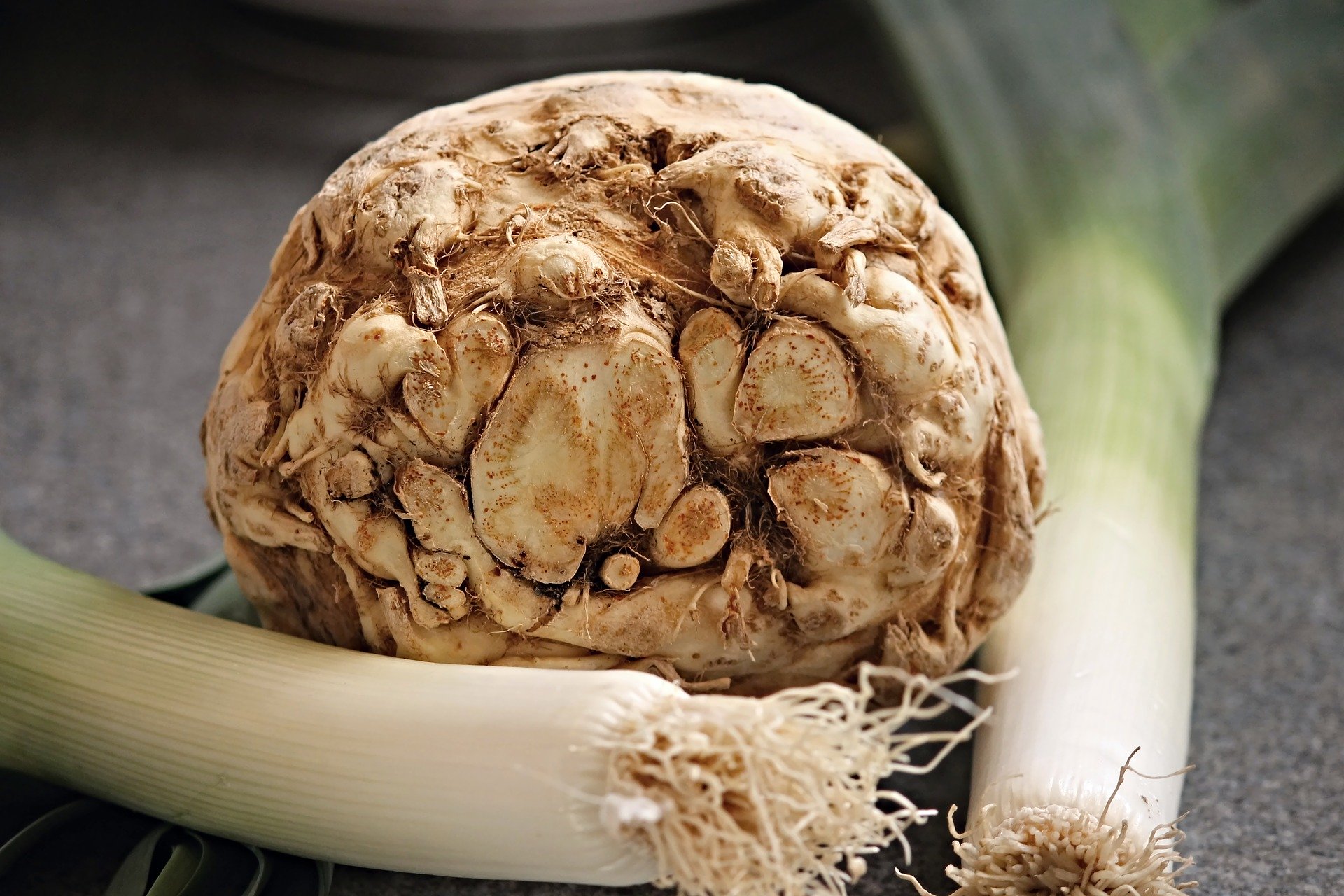Celeriac, Antioxidants, and Fertility

Celeriac is also known as celery root. The leaves, stalk and root are edible and are root is often used to flavour soup as it is stronger in flavour than celery stalk.
Its antioxidant properties (high vitamin C content) can help protect cells, including egg or sperm cells, against free radicals – so it’s a great food to support fertility health! Its high vitamin C content gives it the antioxidant property.
Key nutrients of Celeriac are:
Vitamin K: Vitamin K is an essential nutrient necessary for responding to injuries as it regulates normal blood clotting. Vitamin K can be particularly useful if you suffer from heavy and/or painful periods as it can help slow down the blood flow and reduce cramping.
Vitamin C: For fertility health Vitamin C is important in the process of absorption and also in its ability to support the luteal phase of the menstrual cycle.
Vitamin B Complex: Overall this Vitamin group is necessary for energy production and the synthesis and repair of DNA and RNA. This is vital for your overall health but also for cell function, which includes egg and sperm cells and their genetic health and quality.
Potassium: Is an electrolyte which counteracts the effects of sodium, helping to maintain consistent blood pressure levels – another important element for pregnancy.
Manganese: is a naturally occurring mineral which aids in the formation of connective tissue, bones, blood-clotting factors, and sex hormones.
Phosphorus: Is an element that plays an important role in how the body uses carbohydrates and fats. It is also needed for the body to make protein for the growth, maintenance, and repair of cells and tissues. It is essential in our diet and particularly in children when growth and development occurs.
Iron: Is a mineral that the body uses to carry oxygen in the blood and plays a key role in strengthening the immune system and helps regulate body temperature.
CHINESE FERTILITY MEDICINE USE IT TO:
- Treat Dampness
- Treat Qi Deficiency
- Supports the Kidney
DAMPNESS
Dampness is the word used in Chinese Fertility Medicine to describe an overabundance of negative types of fluids that have accumulated in the body.
This includes mucus, phlegm, or water accumulation (edema) that build up over time in different areas of the body.
A variety of fertility issues can arise from having too much Dampness including immune disorders, fluid retention, circulatory issues, bacterial and fungal overgrowth, and other inflammatory diseases.
Reducing dampness can take some time, but the physical effects you receive will be worth it!
Click here to read more about Dampness
QI DEFICIENCY
Qi is the word used in Chinese Fertility Medicine to describe energy, life force, or vitality inside and outside the body.
Qi is the non-physical aspect of your body that makes all your organs and systems work.
This means that it’s vital for the function of all aspects of your fertility, and pregnancy health too. When your Qi is deficient your body struggles to function efficiently, and this can lead to a variety of fertility issues.
When Qi becomes more severely deficient you will likely present with hormone imbalance, typically with reduced Progesterone, Testosterone and/or FSH levels. In some cases, the FSH can rise and present itself as being elevated, due to the ovaries or testes being underactive and sluggish (tired).
Click here to read more about Qi Deficiency
SUPPORTING YOUR KIDNEY
A term that refers to supporting the reproductive system as Chinese medicine links the kidney to the direct function of the reproductive system. This is because the Adrenal gland is a part of the kidney (sits on top of it) and is responsible for producing and releasing a variety of hormones – in men and women. It is therefore regarded as an organ that determines the healthy function of your fertility and should always be supported.
Celeriac can be prepared in many ways and used in soups, sauces, or served on its own with fish, meat, and with other root vegetables. Boiled and mashed, celeriac makes a delicious celeriac mash and can also be used to top dishes where potato would normally be used.
Season Available: Late autumn to Early Spring
Cautions: Celeriac contains several furanocoumarin compounds like psoralen, bergapten, xanthotoxin, and isopimpinellin, which may cause skin issues (photo-toxicity) in some sensitive individuals. It (along with celery stalk) should be avoided in large quantities in pregnant women. People on diuretic medications and anticoagulant medications should also use celery stalk and root sparingly.
Disclaimer: https://naturalfertilityexpert.com/disclaimer/
Need more help?

Free Guide
8 MISSED CLUES YOUR FERTILITY IS OUT OF BALANCE – even if you’re over 40
Discover What’s Stopping You Having Your Baby
8 MISSED CLUES YOUR FERTILITY IS OUT OF BALANCE – even if you’re over 40
If you’re 40 or over and pregnancy isn’t happening for you naturally, or with IVF, then this guide will help you discover why being 40+ isn’t a barrier to having a baby – as long as you identify the root cause of your fertility issues and then bring your body back into balance.